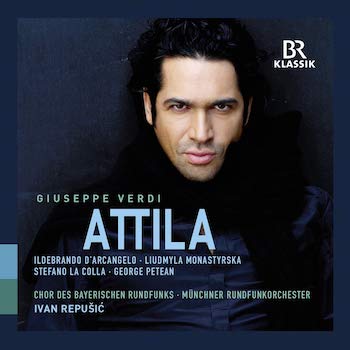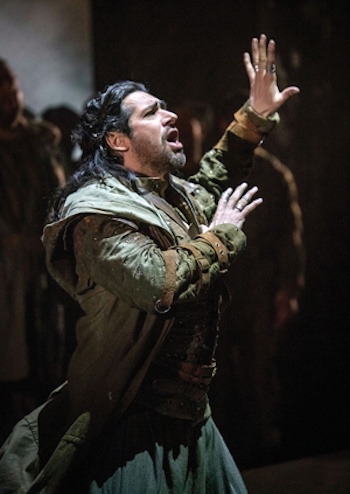Opera CD Review: Verdi’s Opera about Attila the Hun Gets a Taut, Vivid New Recording
By Ralph P. Locke
Metropolitan Opera stars Ildebrando d’Arcangelo and Liudmyla Monastyrska headline a new recording that reveals Verdi operatic mastery five years before Rigoletto.
GIUSEPPE VERDI: Attila
Liudmyla Monastyrska (Odabella), Stefano La Colla (Foresto), Stefan Sbonnik (Uldino), George Petean (Ezio), Ildebrando d’Arcangelo (Attila).Bavarian Radio Chorus, Munich Radio Orchestra, cond. Ivan Repušić
BR 900330 [2 CDs] 101 minutes.
Click here to purchase or to hear the beginning of each track.
 Attila (1846) — the name is accented on the first syllable — is the ninth of Verdi’s sixteen early operas (counting both I Lombardi and its heavy reworking for Paris: Jérusalem). It gets staged less often than, say, Nabucco, Ernani, or Luisa Miller. Yet it is as concise as I due Foscari (which I admired in a recent recording under the same conductor) and more direct and appealing.
Attila (1846) — the name is accented on the first syllable — is the ninth of Verdi’s sixteen early operas (counting both I Lombardi and its heavy reworking for Paris: Jérusalem). It gets staged less often than, say, Nabucco, Ernani, or Luisa Miller. Yet it is as concise as I due Foscari (which I admired in a recent recording under the same conductor) and more direct and appealing.
The title role gives plentiful opportunity for a bass-baritone to emote and declaim, the female role — like that of Abigaille in Nabucco — has a dauntingly wide range and requires much agility, and there are plum parts for a gleaming tenor and a mellifluous baritone. Plus Italian patriotism. What’s not to like?
The patriotism is embodied in the fifth-century Romans, who clearly represent, in their resistance to the invading Huns, Verdi’s compatriots, yearning to form a nation-state free of the Austrian yoke. Verdi, commenting on an early draft of the libretto, particularly admired one character who tries to strike a deal with Attila. In the opera this character (whom the libretto finally named Ezio) makes a bold offer to his country’s fierce enemy: “Avrai l’universo, resta l’Italia a me!” (Let me have Italy, and you can take the rest of the universe). This solemn melodic line arches up to two high F’s, which can be gorgeous sounds for a good baritone. The result “always drew frenzied applause from a contemporary audience” (Julian Budden, The Operas of Verdi 1:251).
Attila is unlikely to come to a theater near you in your lifetime. But it has received many worthy recordings and video versions, some of which have reached YouTube, legally or not, subtitled in Spanish, etc.
Critics have often recommended recordings conducted by Lamberto Gardelli (with Deutekom, Bergonzi, Milnes, and Raimondi) and by Muti (with Studer, Shicoff, Zancanaro, and Ramey). I know of at least six other recordings plus three DVDs, most with major names in leading roles. The videos often show Attila with bare, muscled chest (Samuel Ramey) or in a leather-and-metal-trimmed coat with impressive shoulders and lapels that communicate “male power” in a different way (Ildebrando d’Arcangelo).
Here is the latest recording of Attila, energetic and stylish. It derives from a concert performance (that is: unstaged) at the Prinzregententheater in Munich on October 13, 2019. I have hailed previous recordings made in that sensible-sized hall, including truly forgotten yet in many ways admirable operas by Franz Lachner and Max Bruch.
Ildebrando d’Arcangelo (Attila) is an extraordinarily adaptable performer. is an extraordinarily adaptable performer. Here he plays a, by turns, bullying and superstitiously quivering tyrant. This is quite a contrast to his memorably vivid comic turn as the quack-Doctor Dulcamara in a 2018 HD transmission of Donizetti’s L’elisir d’amore that the Met has been streaming lately!

D’Arcangelo as Verdi’s Attila in Bologna
Photo: Rocco Casaluci
Lyudmila Monastyrska has made a specialty of lyric-dramatic roles (Aida at the Met, including an HD transmission from 2012 that the Met has likewise been streaming) but also of Abigaille (at Covent Garden, opposite Domingo). Not surprisingly, she shows mastery of every twist and turn in the demanding role of Odabella. The only annoyance, perhaps less apparent when heard live than on a recording that one listened to repeatedly, is a tendency toward wobbling on long notes. The wobble is mainly evident early — when her role is particularly fearsome — and disappears halfway through the work, as the writing becomes more lyrical (and perhaps as her voice warms up). Monastyrska’s soaring high notes are impressively firm in the final pages of Act 2. Overall, we are lucky to have this recording of her Odabella.
George Petean (Romanian-born, and much in demand for Verdi roles at La Scala and elsewhere) is steady and spirited as Ezio, sometimes evoking warm memories of such liquid-toned baritones as Sherrill Milnes. I am glad to have “met” him!
As Foresto, Stefano La Colla (who has sung such major roles as Radamès and Calaf) seems rather generalized. Perhaps stage experience in the role, under the guidance of experienced directors and conductors, will help him introduce more shadings and nuances. At present, his most finished delivery comes in the romanza that opens Act 3, and in the trio and quartet that follow it and end the opera. I should also add that, throughout the opera, and even in the romanza, La Colla lacks elegance in the short decorative figures that are a remnant of Rossinian coloratura. Still, his voice has real presence, and he conveys the essence of this passionate character.
The Munich orchestra sounds splendid from beginning to end. So does the chorus (which has a lot to do in the work). Croatian-born Ivan Repušić, the orchestra’s music director since 2017, shows himself, as in the I due Foscari recording, to be a major operatic maestro, keeping the music as forceful or tender as required and always under firm control. Voices carry without shouting or barking. Orchestral details register naturally, and tutti do not overwhelm. Some pizzicato passages are too quiet (as often in opera recordings), and some wind moments are not perfectly tuned. In one exposed passage, the harp’s pitch doesn’t seem to match that of the orchestra. But minor defects such as these are typical when a recording is made during a performance, instead of being carefully tweaked in the studio thanks to the possibility of multiple retakes.
All in all, though Budden and other Verdi scholars have complained about Attila’s discontinuities, the work comes across effectively here, its brevity making for strong contrasts from moment to moment.
The booklet contains a good synopsis, plus a rich, nuanced short essay that is, alas, translated too literally, creating bumps and puzzles. As for a libretto, you’re on your own. I found good Italian ones at opera-arias.com and imslp.org, but no reliable English translation.
The recording is available as a physical CD, as a download, or through subscription streaming services such as Apple Music, Spotify, YouTube, and Naxos Music Library. (Naxos provides full downloadable booklets for most recordings that it streams, even ones on other labels than Naxos.) One can sample the beginning of each track at such sites as PrestoClassical, HBDirect, and (if you subscribe, or your library does) Naxos Music Library.
Ralph P. Locke is emeritus professor of musicology at the University of Rochester’s Eastman School of Music. Six of his articles have won the ASCAP-Deems Taylor Award for excellence in writing about music. His most recent two books are Musical Exoticism: Images and Reflections and Music and the Exotic from the Renaissance to Mozart (both Cambridge University Press). Both are now available in paperback; the second, also as an e-book. Ralph Locke also contributes to American Record Guide and to the online arts-magazines New York Arts, Opera Today, and The Boston Musical Intelligencer. His articles have appeared in major scholarly journals, in Oxford Music Online (Grove Dictionary), and in the program books of major opera houses, e.g., Santa Fe (New Mexico), Wexford (Ireland), Glyndebourne, Covent Garden, and the Bavarian State Opera (Munich). The review first appeared, in a somewhat shorter version, in American Record Guide and is posted here by kind permission.
Tagged: Attila, GIUSEPPE VERDI, Ildebrando d’Arcangelo, Lyudmila Monastyrska
